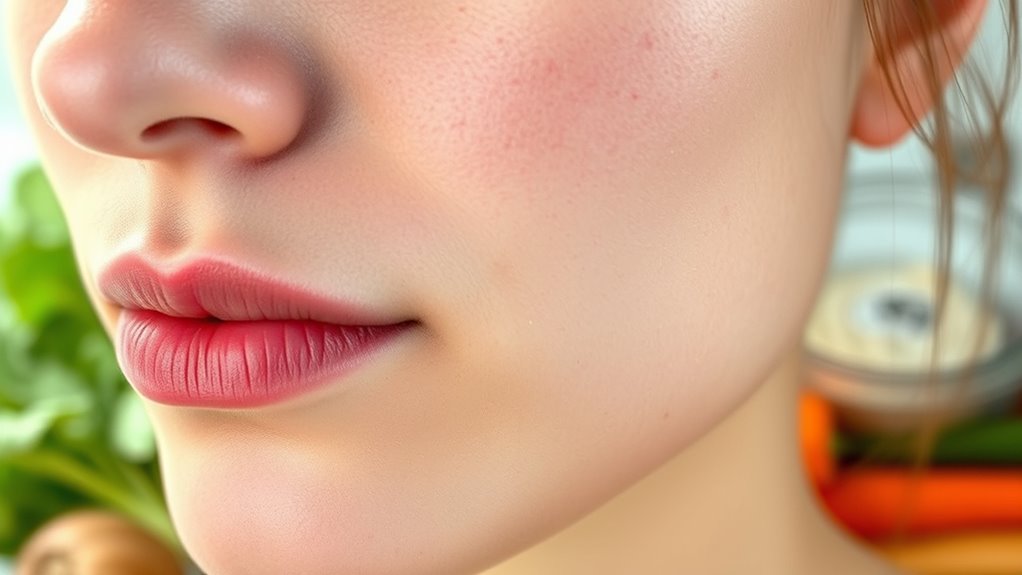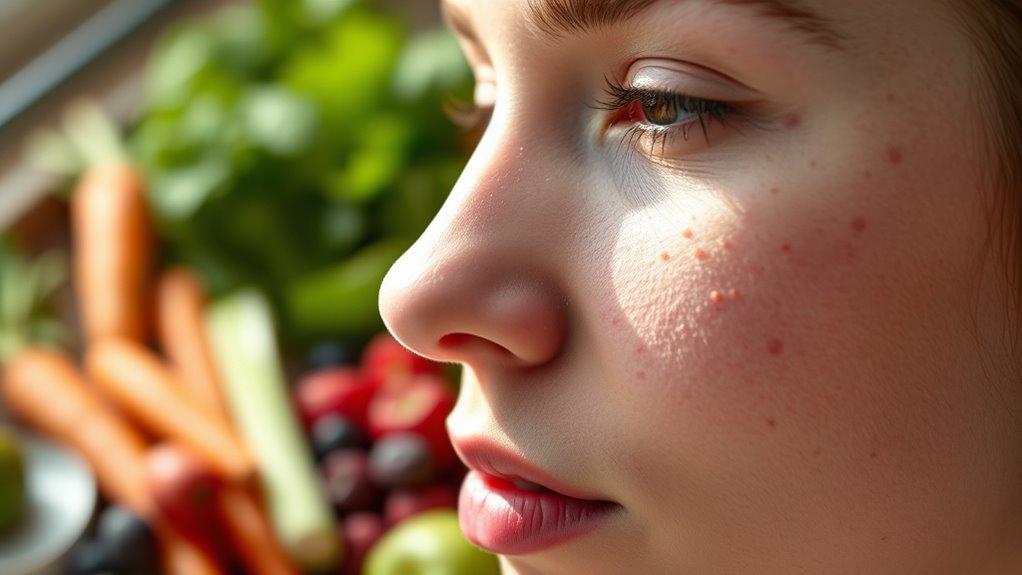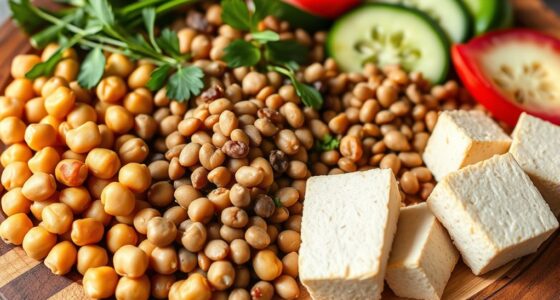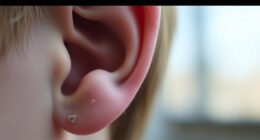Your gut-skin axis plays a crucial role in acne development, as an imbalanced microbiome can increase inflammation and hormone fluctuations that trigger breakouts. Eating a diet rich in whole grains, fruits, vegetables, and probiotic foods can support your gut health, reduce inflammation, and help clear your skin. Limiting sugar, processed foods, and dairy may also improve your skin condition. To discover simple ways to enhance both your gut and skin health, keep exploring this connection.
Key Takeaways
- A healthy gut microbiome reduces systemic inflammation, which can improve acne and skin clarity.
- Diets rich in probiotics, fiber, and anti-inflammatory foods support gut health and may decrease acne flare-ups.
- High sugar and processed foods disrupt gut bacteria balance, increasing inflammation and worsening acne.
- Omega-3 fatty acids and low-glycemic foods help regulate hormones and reduce skin inflammation linked to acne.
- Lifestyle habits like adequate sleep, stress management, and hydration foster a balanced gut-skin axis and clearer skin.
Understanding the Gut-Skin Connection

Have you ever wondered how your gut health affects your skin? The connection isn’t just coincidence; it’s a real, biological link. Your gut hosts trillions of bacteria that help digest food, produce vitamins, and regulate inflammation. When this balance gets disrupted—say, from poor diet, stress, or antibiotics—it can lead to an imbalance called dysbiosis. Dysbiosis increases intestinal permeability, often called “leaky gut,” which allows toxins and bacteria to escape into your bloodstream. These substances can trigger inflammation all over your body, including your skin. Understanding this connection helps you see how your gut’s health directly impacts your skin’s appearance and condition. Efficient digestion systems in your gut play a vital role in maintaining overall health and skin clarity.
How Diet Influences Skin Health

Your diet plays a essential role in shaping your skin’s health, as the nutrients you consume directly influence inflammation, oil production, and skin cell renewal. Eating a balanced diet rich in fruits, vegetables, lean proteins, and whole grains supplies antioxidants and essential vitamins that help combat oxidative stress and support skin repair. Conversely, high-sugar and processed foods can spike insulin levels, boosting oil production and increasing the risk of breakouts. Dairy products may also contribute to acne in some individuals. Hydration is equally important; drinking enough water helps keep your skin plump and flushes out toxins. Incorporating antioxidant-rich foods can further help protect your skin from environmental damage. By choosing nutrient-dense foods and limiting inflammatory triggers, you can improve your skin’s appearance, reduce acne, and promote a clearer, healthier complexion.
The Role of Gut Microbiota in Acne Development

Emerging research highlights that the gut microbiota plays a crucial role in acne development by influencing systemic inflammation and hormone regulation. When your gut bacteria are balanced, they support immune function and help regulate oil production, reducing the likelihood of clogged pores and breakouts. Conversely, an imbalanced microbiome—due to poor diet, stress, or antibiotics—can lead to increased inflammation and hormonal fluctuations that promote acne. Certain bacteria produce compounds that either calm or trigger skin inflammation. Disruptions in gut flora can also affect insulin levels, further stimulating excess oil production. Additionally, advancements in neural network integration are enabling more precise understanding of microbiome-skin interactions, which may lead to targeted therapies. By maintaining a diverse and healthy microbiome, you can help mitigate factors that contribute to acne, supporting clearer skin from the inside out.
Foods That May Help Reduce Acne Flare-Ups

You can support your skin by choosing foods rich in omega-3 fatty acids, which help reduce inflammation. Incorporating low-glycemic foods keeps your blood sugar stable and may prevent breakouts. Additionally, probiotic-rich options boost your gut health, potentially decreasing acne flare-ups. Being aware of the Pinball Machine Weight can also help you understand how certain heavy foods or supplements might impact your overall health.
Omega-3 Fatty Acids
Omega-3 fatty acids are known for their anti-inflammatory properties, which can help reduce the severity and frequency of acne flare-ups. When you include omega-3s in your diet, you support your body’s ability to fight inflammation that triggers acne. Rich sources like fatty fish (salmon, mackerel, sardines), flaxseeds, chia seeds, and walnuts provide these beneficial fats. Consuming enough omega-3s may also help balance oil production and prevent pore clogging, contributing to clearer skin. Incorporating omega-3-rich foods into your meals can be a simple yet effective way to manage acne from within, promoting a healthier gut-skin connection. Community Engagement within creative communities can also inspire innovative approaches to skincare and health.
Low-Glycemic Foods
Incorporating low-glycemic foods into your diet can markedly reduce acne flare-ups by preventing blood sugar spikes that trigger inflammation. When you eat high-glycemic foods like white bread, sugary snacks, or sweetened beverages, your blood sugar rises quickly, prompting your body to release insulin. Elevated insulin levels can increase oil production and promote inflammation, both of which worsen acne. Choosing low-glycemic options such as whole grains, legumes, and most fruits helps keep your blood sugar stable. These foods digest more slowly, reducing insulin spikes and inflammation. Additionally, understanding the importance of diverse food genres can encourage you to explore a variety of healthy, low-glycemic choices. Over time, this approach can lead to clearer skin and fewer breakouts. Making mindful food choices centered around low-glycemic foods supports your overall skin health by balancing your blood sugar and reducing skin irritation.
Probiotic-Rich Options
Could adding probiotic-rich foods to your diet help reduce acne flare-ups? Incorporating fermented foods like yogurt, kefir, sauerkraut, kimchi, and kombucha can boost your gut’s beneficial bacteria. These probiotics help balance your microbiome, which may reduce inflammation and improve skin health. When your gut functions best, it can better manage toxins and regulate immune responses, potentially decreasing acne breakouts. Choosing products with live and active cultures maximizes benefits. You might also consider probiotic supplements, but natural foods often provide additional nutrients supporting skin health. Remember, microbiome balance is essential for overall well-being and skin clarity. Consistency is key. Including these probiotic options regularly can help maintain a healthy gut-skin connection, possibly leading to fewer flare-ups and clearer skin over time.
Lifestyle Habits to Support Gut and Skin Balance

Maintaining a balanced lifestyle is essential for supporting both gut and skin health. You should prioritize regular sleep, aiming for 7-9 hours each night, to help your body recover and regulate hormones that influence skin clarity. Managing stress through mindfulness, exercise, or hobbies can reduce inflammation and improve gut function. Incorporate physical activity into your routine, as it boosts circulation and gut motility, promoting overall wellness. Limit smoking and excessive alcohol consumption, which can harm your gut lining and skin barrier. Staying hydrated helps flush toxins and keeps your skin plump and supple. Also, avoid prolonged antibiotic use unless necessary, as it can disrupt your microbiome. Being aware of industry trends can help you stay informed about new health practices and products. By making these habits part of your daily routine, you support a healthy gut-skin connection and reduce the risk of breakouts.
Practical Tips for Improving Your Gut and Skin Health

To support your gut and skin health, start by adding probiotic-rich foods like yogurt and fermented vegetables to your diet. Cutting back on sugar helps reduce inflammation and keeps your skin clear. Also, choose whole grains over refined carbs to nourish your gut and promote a healthy glow. Incorporating self-watering planters into your gardening routine can help grow fresh herbs and vegetables effortlessly, supporting your overall health.
Incorporate Probiotic Foods
Incorporating probiotic foods into your daily diet is a simple yet effective way to support both your gut and skin health. These foods introduce beneficial bacteria that help balance your gut microbiome, which can reduce inflammation and improve skin clarity. You might add yogurt with live cultures, kefir, sauerkraut, kimchi, or fermented vegetables to your meals. Aim to include these regularly, but start gradually to allow your digestive system to adjust. Choosing unpasteurized and minimally processed options guarantees you’re getting active probiotics. Remember, consistency is key—over time, these foods can enhance your gut barrier, boost immunity, and potentially lessen acne outbreaks. Additionally, Wickless Candle Making techniques can be used to create soothing environments that promote relaxation, which may indirectly benefit skin health. Incorporate them into your routine, and you’ll likely notice a positive change in your skin’s appearance and overall gut comfort.
Limit Sugar Intake
Reducing your sugar intake is a powerful step toward better gut and skin health, as excess sugar can disrupt your microbiome and promote inflammation. High sugar levels feed harmful bacteria and yeast in your gut, leading to an imbalance that can trigger skin issues like acne. Cutting back on processed foods, sugary drinks, and sweets helps stabilize your blood sugar and supports beneficial microbes. Focus on reading labels to spot hidden sugars, and choose natural alternatives when possible. By limiting sugar, you reduce inflammation, enhance gut health, and may see improvements in your skin’s clarity. Remember, small changes add up—making conscious choices about your sugar intake can have a significant impact on your overall skin and gut wellness.
Focus on Whole Grains
Focusing on whole grains is an effective way to support both your gut and skin health. Whole grains provide fiber that nourishes beneficial gut bacteria, reducing inflammation linked to acne. They also help regulate blood sugar levels, preventing insulin spikes that can worsen skin issues. To incorporate more whole grains, swap refined grains for options like oats, brown rice, and barley. These choices boost your fiber intake and promote a balanced microbiome. Here’s a quick guide:
| Whole Grain | Benefits | Best Ways to Include |
|---|---|---|
| Oats | Rich in soluble fiber | Breakfast porridge, smoothies |
| Brown Rice | Low glycemic index | Stir-fries, salads |
| Barley | Supports digestion | Soups, grain bowls |
Making these swaps can visibly improve your gut and skin over time.
Frequently Asked Questions
Can Probiotic Supplements Effectively Improve Acne Symptoms?
You’re wondering if probiotic supplements can help clear up acne. While research is still emerging, probiotics may boost your gut health, reduce inflammation, and balance bacteria, all of which could improve your skin. You might see some benefits with consistent use, but results vary. It’s best to combine probiotics with a balanced diet and skincare routine. Always consult a healthcare professional before starting new supplements for personalized advice.
Are There Specific Dietary Patterns Linked to Chronic Acne?
Did you know that studies show over 50% of people with acne experience worse symptoms after consuming high glycemic index foods? You might notice that your diet impacts your skin, especially if you eat lots of sugar, dairy, or processed foods. Focusing on a balanced diet rich in fruits, vegetables, and whole grains can help reduce inflammation and improve your skin’s health over time.
How Quickly Can Diet Changes Impact Skin Clarity?
When you change your diet, you might notice improvements in your skin within a few weeks, but it varies based on your body’s response. By cutting back on processed foods and sugar, and adding more whole, nutrient-rich options, you could see clearer skin sooner. Consistency is key—stick with your new eating habits, and you’ll likely see positive changes in your skin’s clarity over time.
Do Food Sensitivities Influence the Gut-Skin Axis?
Food sensitivities can considerably influence the gut-skin axis. When you’re sensitive to certain foods, your immune system reacts, causing inflammation that can affect your gut health. This disruption often leads to skin issues like acne or redness. By identifying and avoiding these trigger foods, you may reduce inflammation and improve your skin. Paying attention to how your body responds helps you better manage your gut and skin health together.
Is There a Genetic Component to Gut-Related Skin Issues?
Think of your genetics as the blueprint of a house; it shapes how everything is built, including your skin and gut. Yes, there’s a genetic component to gut-related skin issues. Your genes can influence your immune response, inflammation levels, and how your gut bacteria balance. So, if you notice recurring skin problems, it might be worth exploring your family history and considering genetic factors alongside lifestyle and diet.
Conclusion
By paying attention to your diet and lifestyle, you can truly support your gut and skin health. Embracing nourishing foods and habits helps keep your gut microbiota balanced, which may reduce acne flare-ups. Are you ready to take control of your skin’s future? Small daily changes can make a big difference, so start today and enjoy clearer, healthier skin from the inside out. Your gut-skin connection is powerful—why not harness it?









